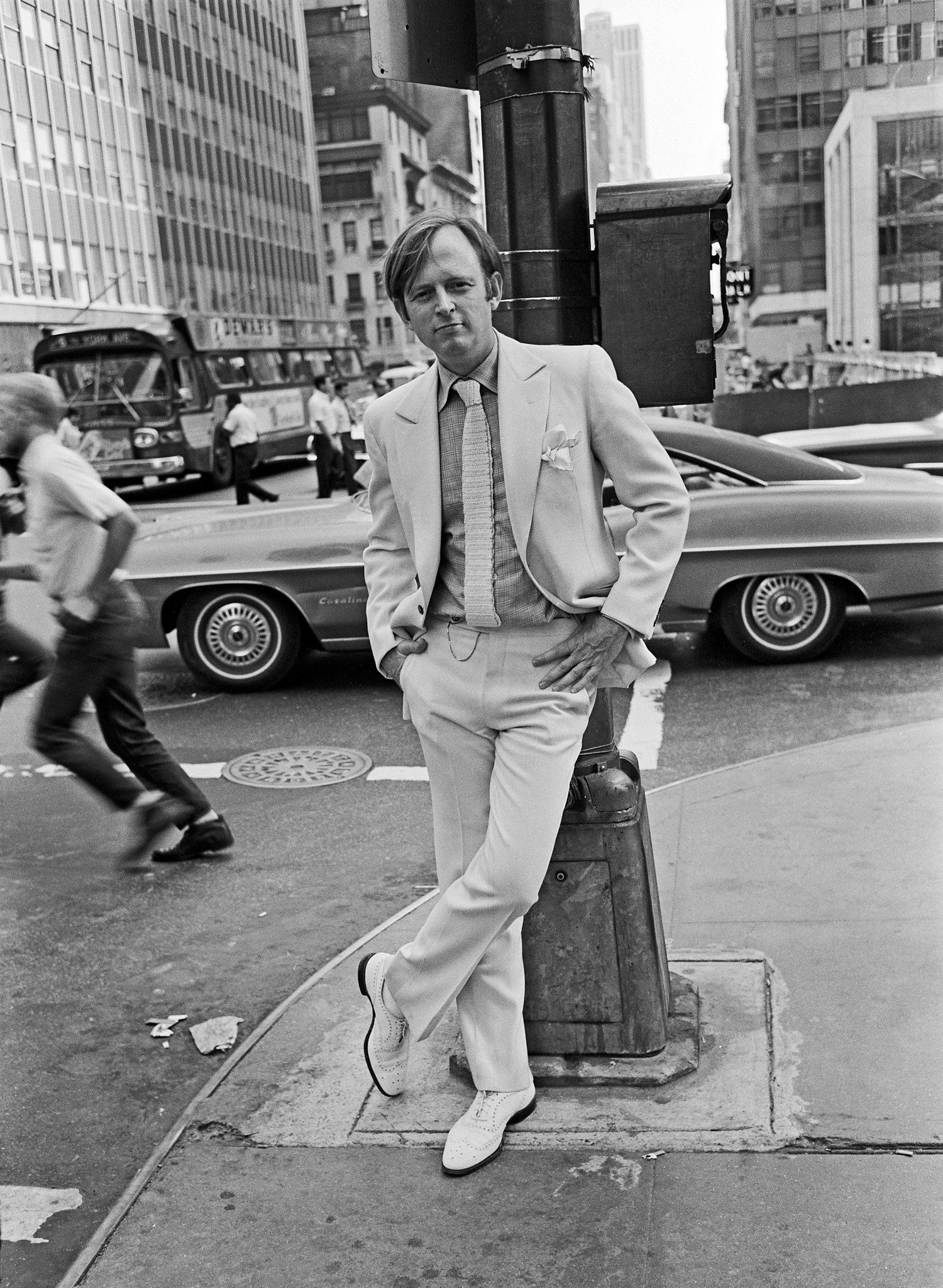Not every writer can be Tom Wolfe. Not every writer should be. I mean, what are you supposed to do with all those ridiculous and revelatory exclamations of shock and astonishment? How do you deal with the ellipses and m-dashes and exclamation points— punctuating … dividing … ruminating—forcing you into the brains of his characters (real and imagined) and not letting you escape (and not wanting to)? What kind of freak writing is this that inserts you into a world—HEY!—you know nothing about—RIGHT HERE!—and then convinces you—WHACK! WHACK! WHACK!—that you understand it completely?—FUCKIN’ A, BUBBA!
See? I’ve proven it in that last paragraph: not every writer can be Tom Wolfe.
May 1995: I was waiting in an airport as the plane that was supposed to be at my gate was doing fifty-mile-wide circles overhead. I was supremely unprepared for a delay, so I went to the newsstand and pulled The Bonfire of the Vanities from the paltry selection of paperbacks. Suddenly the annoyance of my delay didn’t matter, because I wasn’t sitting in an uncomfortable plastic seat fidgeting along with two hundred strangers in their uncomfortable plastic seats any more.
I was a wall-streeter in my tinted-windowed Mercedes, lost in the Bronx, making wrong turns into disaster; I was at my desk at Precinct Headquarters spewing obscenities and drinking sludge-serving-as coffee with my soldiers-in-arms (most of whom were major assholes like me); I was flung into a Bronx holding cell with vermin (human and otherwise) knowing I belonged there but steadfastly believing that the law (that pesky law!) was meant for others less important and less connected than me; I was in courtrooms, newsrooms, and barrooms; I was a reporter, a judge, a street thug, a golden boy, a tabloid sensation, a Master Of The Universe!; I lived in an over-mortgaged multi-million dollar apartment on Central Park West—having everything … yet knowing tomorrow I’d have nothing.
As I lost myself in this world, somewhere in the back of my brain there was a voice wearing a smile, asking me if I was entertained … daring me to try and stop turning pages. And then the voice said, with the tone of a wagging finger, “Don’t get too comfortable. Yeah, I made all these people up … but they exist. All these idiots and braggarts and thieves and heroes—they are all fake … and all very real.”
My plane arrived. I think. I probably grabbed my carry-on and into seat 9B. Or 14F. Or 25C. One of those airplane seat numbers. It didn’t matter. I presume the plane flew in the air … made a connection in some city … landed on a runway. It didn’t register. I was lost in Tom Wolfe’s world. Smitten. The Bonfire of the Vanities had just become the BEST BOOK EVER. I have read it four or five times since then. That number could be much higher, but I force myself to put off returning to it — so that when I finally do I am knocked off my chair like I was knocked off that plastic chair at JFK. It is on my bedside table right now, ready at a moment’s notice if I need a little pick-me-up. I can open that book to any page and the audacity and vitality and brashness will thill and astonish and amaze me—even when I know what’s coming next.
I tear through Tom Wolfe’s books, unable to slow myself down, continually reminding myself that I am going too fast and missing stuff. (So much stuff!) I marvel at his paragraph-long sentences, and his one-word sentences. I am awed at his uncanny ability to change voices, and how he can burrow deep into the souls of his subjects and find—often in a single slice of prose or a solitary line of dialogue—the essence of who they really are. How it it possible, I wonder, to achieve that level of brilliance? (I found out, reading his obituary on Tuesday, that part of it was ten triple-spaced typewritten pages a day. 1000 or 2000 words. No matter what. Every day. Without fail. The other part of it must have been that he was blessed by the gods.)
So tonight I may revisit Bonfire’s fictional Master-of-the-Universe Sherman McCoy and his nightmare wrong-turn in the Bronx. Or maybe The Right Stuff and it’s very real Flyboy/Astronaut Alan Shepherd has he commands Mission Control to “Light This Candle!” while sitting atop a fully loaded missile that would either send him to the edge of the atmosphere or … you know … explode.
Not every writer can be Tom Wolfe. Not every writer should be. The fact is, there can only be one.



I love your post – your writing – and the unabashed joy you feel when reading Tom Wolfe’s books. May you revisit his works often to enrich your spirit.
Electric Kool-aid acid test
Kandy Kolored …
Those were the two I really read all the way thru.
They were 60’s books and don’t read “historically” these days, but I loved this guys style.
All of a sudden I realized punctuation syntax and spelling wasn’t important. If I wanted a break in the action???…………I put in a row of periods. So I write like that to this very day thanks to TW …..the man in the white suit.
Nice piece of writing David.
I don’t read books. I skim most of what I read, read the reviews or see the movie. What, there was a movie! What amazes me the most about Tom Wolfe is his scope. When I read his obit, and yes I did read all of it. What struck me is his scope.
There are many prolific writers out there but in most cases they’re “one trick ponies” of the writing world. Great stuff repeated over and over, but not here. Any one of the these books, Bonfire, The Right Stuff or the Electric Kool-Aid Acid Test (what was the research for that?) would define a whole career. Knowing that these were all done by one person is truly amazing.
David, we need to have a film festival of all Tom Wolfe’s books that were turned into movies to solidify the experience.
We would have to skip Bonfire. It’s one of the worst film adaptations EVER. But The Right Stuff … ah, The Right Stuff. Now there is a magnificent film!
Excellent! That movie for me has great personal resonance. I was such a space geek as a kid as was my best friend Chris Grant and his brothers. It summarizes the space program, the people and that period in our society when we were so proud of what we could accomplish. I still use my favorite quote in the movie when justifying advanced technology projects to management – “No bucks, no Buck Rogers”.